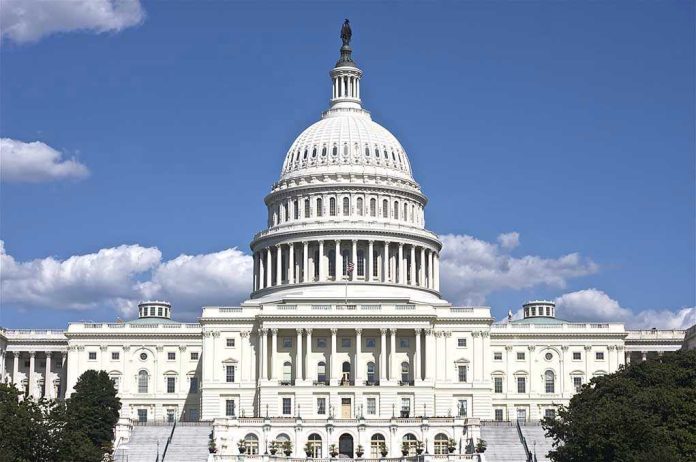
House Republicans’ urgent resolution to censure Ilhan Omar for “disgraceful” remarks about Charlie Kirk’s assassination highlights the escalating battle over free speech, accountability, and American values inside Congress.
Story Snapshot
- Rep. Nancy Mace filed a privileged resolution to censure Ilhan Omar and remove her from key House committees after Omar’s comments about Charlie Kirk’s assassination.
- The move forces a rapid House vote, intensifying partisan conflict and debate over congressional integrity.
- The controversy underscores ongoing clashes over free speech, political violence, and the boundaries of acceptable rhetoric in Washington.
- This is the fifth censure resolution against Omar since 2019, reflecting deepening polarization in Congress.
Privileged Resolution Targets Omar After Kirk Assassination
Rep. Nancy Mace (R-S.C.) announced the filing of a privileged resolution to censure Rep. Ilhan Omar (D-Minn.) and strip her of committee assignments, specifically the House Committee on Education and the Workforce and the House Committee on the Budget. Mace’s action responds to what she and fellow Republicans call “disgraceful” remarks and social media reposts by Omar following the assassination of conservative activist Charlie Kirk at Utah Valley University, a tragedy that has shaken conservative circles and reignited debate over political violence and respect for differing views.
The privileged resolution, a rarely used procedural tool, bypasses the usual committee review and compels the House to vote within two legislative days. This measure ensures swift consideration and prevents Democratic leadership from stalling or burying the issue, reflecting a growing Republican determination to hold members accountable for rhetoric perceived as hostile to conservative values. Mace’s statement declared that free speech is not free from consequences and insisted Omar’s actions are incompatible with American values, calling for her removal from Congress committees as both punishment and a warning against future conduct deemed disrespectful.
Background: Patterns of Partisan Discipline and Polarization
This latest resolution marks the fifth attempt since 2019 to censure Omar, underscoring her contentious role in congressional politics and the persistent friction between progressive Democrats and conservative Republicans. Omar, a member of the so-called “Squad,” has previously faced removal efforts over remarks about Israel and other issues, making her a frequent target for GOP discipline. The assassination of Charlie Kirk, founder of Turning Point USA, intensified scrutiny on political discourse, with Omar’s subsequent interview and reposted videos interpreted by Republicans as disparaging both Kirk and his supporters. These developments build on a pattern where committee removal is increasingly wielded as a partisan weapon, raising concerns about long-term institutional stability and the chilling effect on free speech in Congress.
Omar and her Democratic allies contend that her remarks were taken out of context, defending her right to free expression and arguing that Republican responses are politically motivated attempts to silence dissent. The heightened partisanship surrounding this controversy has led observers to warn of further polarization, as each side sees disciplinary measures as either essential accountability or dangerous overreach.
Immediate and Long-Term Impacts on Congressional Norms
Should the resolution succeed, Omar would be stripped of her influential committee assignments, reducing her ability to represent her constituents and participate in legislative oversight. For Kirk’s supporters and many conservatives, this action represents a victory for accountability and respect for those targeted by political violence. However, experts caution that normalizing committee removals for controversial speech risks undermining institutional norms and further weaponizing congressional procedures.
Politically, the controversy amplifies debates over the limits of acceptable rhetoric, the line between free speech and incitement, and the boundaries of partisan retaliation. Socially, it fuels broader public anxiety about safety, respect, and the future of civil discourse in Washington. No direct economic effects are identified, but the implications for congressional governance and the tone of national debate are profound.
Expert Perspectives and Source Verification
Political analysts and congressional scholars agree that the privileged resolution’s use for committee removal is a significant escalation, bypassing the normal review process and expediting disciplinary action. Free speech advocates warn against setting a precedent where controversial opinions alone justify such punishment, urging the development of clear, consistent standards for congressional discipline. Both Republicans and Democrats frame the issue through their respective lenses: safeguarding integrity and values versus protecting dissent and minority voices. All procedural details and timeline events are corroborated by multiple reputable sources, with no significant contradictions found. Fact-checkers also clarify that some claims circulating on social media about Omar’s committee removals are inaccurate, highlighting the importance of verifying information in a highly charged environment.
Sources:
BNO News: House Republicans move to censure Ilhan Omar over reposts about Charlie Kirk
Fox News: Ilhan Omar’s committee assignments under threat after disparaging Charlie Kirk’s legacy
PolitiFact: No, Ilhan Omar wasn’t just removed from the House Foreign Affairs Committee







